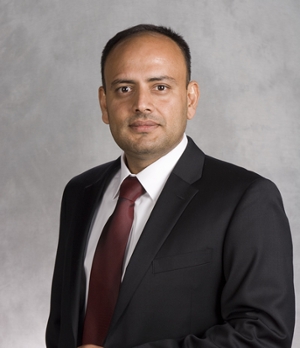Get started with UMSL
Apply hereMaster of science
The fight against cybercrime’s growing and ever-complex threats permeates all levels of an organization. While a dedicated cybersecurity team tirelessly identifies risks and guards against intruders, its leaders communicate with both technical professionals and the rest of the company. This can include individuals ranging from executives needing to sign off on proposed security measures to employees easily swayed by social engineering. The University of Missouri-St. Louis’s master of science in cybersecurity degree program with an emphasis in information systems and technology equips you for this role. Course work builds off existing information technology knowledge to help you guide and educate others at all organizational levels.
For too long, businesses thought antivirus software and a general-knowledge information technology team kept them secure from malware, security breaches and ransomware attacks. Yet, cybercriminals continue to refine their methods. An organization’s cybersecurity policy can’t be static as a result. Instead, its ever-changing, always-anticipating nature requires experienced technical and leadership professionals ready to identify, react and inform from within and beyond an information technology team.
Considering this, the master’s in cybersecurity with an emphasis in information systems and technology bridges both areas. You’ll advance your knowledge of network security practices while starting to see yourself as a resilient leader. At the same time, this multidisciplinary program created through a partnership between the College of Business Administration’s Department of Information Systems and Technology and the College of Arts and Sciences’ Department of Computer Science reflects UMSL’s mission to close the cybersecurity talent gap.
Designated by the National Security Agency and Department of Homeland Security as a National Center of Academic Excellence in Cyber Defense Education, we strive to graduate determined technical and business-oriented cybersecurity professionals ready to find solutions to today’s challenges. We don’t simply teach essential concepts. We further ensure our curriculum covers the latest methodologies. Pairing theories with hands-on learning, we encourage our students to develop a cybersecurity mindset that they’ll take out into the workforce.
Fostering our students’ progress involves faculty members who advance the field themselves through industry-changing research and additional experiential opportunities through the Cybersecurity and Information Technology Innovation Lab’s virtual environment.
Quick facts
Official name
Master of science in cybersecurity with an emphasis in information systems and technologyCampus
Program type
Master's degreeAcademic home
College of Business Administration | Department of Information Systems and TechnologyDelivery mode
100% onlineAccreditation
Higher Learning CommissionCredit hours
30Estimated cost
$23,070.00*This cost is for illustrative purposes only. Your hours and costs will differ, depending on your transfer hours, your course choices and your academic progress. See more about tuition and financial aid.
Careers
UMSL designed the master’s in cybersecurity with an emphasis in information systems and technology for individuals across a diverse spectrum of undergraduate backgrounds. You’re someone who may have already started a career in information technology or a related area, has dabbled with or transitioned to cybersecurity and now aspires to a leadership role. A bachelor’s in information technology isn’t required for admission. Instead, we look for candidates with a basic technical foundation—some computer programming and knowledge of business statistics—and work experience related to information technology.

Career prospects
A 30 credit–hour curriculum blending network security, project management, server environments, information security, advanced cybersecurity and leadership refines and accelerates what you know. Providing you with the tools to excel in a new endeavor, the program prepares you to perform the following skills:
- Resolve complex cybersecurity issues through fundamental principles and formal models.
- Enforce security and compliance requirements while implementing your organization’s information security policies.
- Manage risks through the selection and maintenance of information systems.
- Clearly communicate cybersecurity issues to a range of professionals—from technical-minded information technology employees to executives and stakeholders.
- Effectively lead cybersecurity teams through day-to-day tasks, new security detection efforts and emergencies.
Potential career paths include
See yourself making an impact as a professional directing an organization’s cybersecurity measures. As risks affect international corporations to government organizations to startups and small, specialty businesses, the Bureau of Labor Statistics predicts 31% more positions for information security analysts between now and 2029.
Job titles utilizing your broadened skill set include:
- Cybersecurity specialist
- Cyber defense analyst
- Cloud security specialist
- Information security analyst
- IT/security auditor
- Security architect
- Information systems security manager
Program structure
The master’s in cybersecurity with an emphasis in information systems and technology immerses you in all subject matters with a fully online, 30 credit–hour structure. Core courses compose 24 credit hours, and you’ll take six (6) credit hours of electives to finish the program.
No on-campus visits are required. The typical online master’s student completes their degree in two to three years, taking two to three courses per semester.
Course work incorporates hands-on learning throughout to reinforce your newly acquired skills. To apply your knowledge, you’ll complete a capstone project involving students from this and the computer science emphasis. Together, you’ll practice monitoring and identifying cyber threats in a simulated setting, developing an information security management plan, conducting risk assessments and implementing technical and administrative controls.
Course work includes
As you start this new journey, you’ll learn about the following cybersecurity topics:
- Server infrastructure.
- The challenges of data networking and network security.
- The management and technical aspects of information security.
- Advanced cybersecurity principles.
- Software assurance.
- Running a systematic information security management program.
- Project management techniques.
Delivery
100% onlineCalendar system
SemesterTypical program length
3 yearsTypical course load
1-2 classes per semesterAccreditation
The University of Missouri-St. Louis is accredited by the Higher Learning Commission, one of six regional institutional accreditors in the United States.
Faculty spotlight

Dr. Mirchandai’s research contributes to the field of information systems in three primary areas, which include information systems planning practices in organizations, implementation of large scale information systems and adoption of electronic commerce and electronic government. His research has been published in academic journals such as Communications of the ACM, International Journal of Electronic Commerce, Journal of Organizational Computing and Electronic Commerce, Journal of Global Information Management, Information & Management, Information Systems Journal, and Omega.

Dr. Khan is currently developing cybersecurity programs at the University of Missouri-Saint Louis and teaches data networking and information security. Dr. Khan has published in journals, such as the Journal of Business Research, Journal of Strategic Information Systems, Journal of Information Technology and more. He has also presented papers at national academic conferences, authored book chapters and produced practitioner oriented research and industry reports.
His research interests include offshoring of business services, innovation and entrepreneurship and management of information technology and information security in high-reliability environments.
